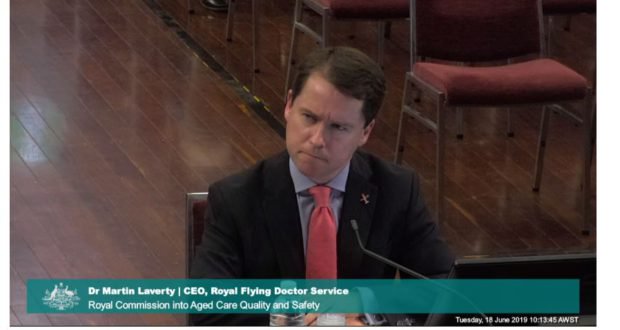Maggots were found in the mouth of a respite patient at an aged care facility in Broome and the incident was reported anonymously to the aged care complaints commissioner.
The Royal Commission's Broome hearing was told that during the course of an evening in wet season, flies entered the mouth of the patient – who had poor ability to chew – layed eggs and produced maggots. The commission was told that the incubation period for maggots is usually approximately eight hours.
We also heard from Martin Laverty, chief executive of the Royal Flying Doctor Service (RDFS). He told the commission that the excuse of small populations and workforce shortages are not good enough to explain poor care to remote communities.
“Medicare is one of this nation’s greatest assets but it does not serve the health interests of remote Australians, and because of the interdependence of primary care access with aged care, we are letting older Australians down by a failing primary care system in remote Australia,” he said.
“Until we articulate an expectation as to what is a reasonable standard of access to primary care, in both volume of access but also the quality of access, is it insufficient to just have access to GPs without palliative care, without geriatrics, without dental care in remote Australia? And the commission has an opportunity to articulate a reasonable standard.”
Laverty told the commission that in the opinion of the RFDS, there was insufficient “prevention, primary and rehabilitation healthcare access in many parts of rural and remote Australia".
He pointed to stats that show remote areas have half the coverage of doctors compared with cities – with 459 per 100,000 people in cities compared with 225 per 100,000 people in remote areas.
The commission heard about the issues specific to the Aboriginal and Torres Strait Islander community in Broome and the surrounding areas.
Lack of access to respite, poor cultural safety and awareness in aged care facilities and staff turnover were recurring issues.
Leon Flicker, from the University of Western Australia, told the commission that although Aboriginal and Torres Strait Islanders make up three per cent of the population, they only occupy one per cent of aged care beds.
In his opinion this can be due to a number of reasons. The Aboriginal population often develop age-related syndromes at a younger age and therefore aged care might not be appropriate.
Remoteness is another problem as well as a belief amongst the community that residential care is not culturally safe as, in his opinion, “frank racism is commonplace”.
Navigating My Aged Care is another barrier to care according to Flicker.
“It’s tortuous for a literate middle-class Melburnian. It’s impossible for a remote Aboriginal Kimberley person who may not be literate, may not own a computer, may not even own a landline or a mobile phone... The idea that this is a system that is navigable by the average client is basically absurd.”
Flicker was asked if he could have a wishlist of reforms that the royal commission could propose, what would he include.
Navigators for the My Aged Care system was one wish. Another was Aboriginal owned and operated aged care facilities.
“My last wish is supporting the traditional roles of the elders, which is part of the Uluru Statement.”
The Royal Commission moves to Perth starting 24 June.
Do you have an idea for a story?Email [email protected]
 Aged Care Insite Australia's number one aged care news source
Aged Care Insite Australia's number one aged care news source

